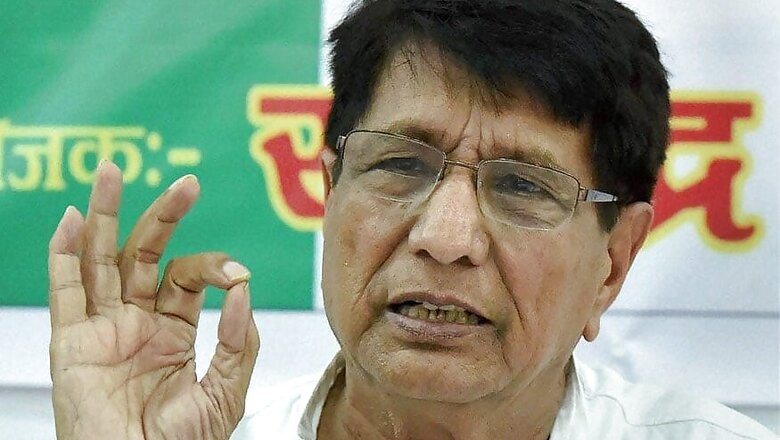
views
Destiny denied Ajit Singh the prospect of seeing the green shoots of recovery in Uttar Pradesh’s Opposition at the moment he departed. The Rashtriya Lok Dal (RLD)—the party that Singh founded in 1996 after an eventful but painful engagement with the Socialists and their clones—in conjunction with its latest partner, the Samajwadi Party (SP), reportedly turned in a good showing in the panchayat polls on its turf in western UP. It was hard for Singh to see the ignominy of his defeat and that of his son and political heir, Jayant Chaudhary, in the 2019 Lok Sabha elections to the Bharatiya Janata Party. The RLD does not have a single legislator in the UP assembly nor an MP in the Lok Sabha or Rajya Sabha. Its lone MLA, Sahendra Singh Ramala, who was elected from Chhaprauli in Baghpat, defected to the BJP in 2018. Baghpat in western UP was a synonym for Singh’s father, the legendary Chaudhary Charan Singh, who was Prime Minister between July 1979 and January 1980. Baghpat was also the epicentre of Jat politics, the once powerful intermediate caste of agriculturists to which Charan Singh belonged.
Ajit Singh passed away on Thursday morning at age 82 after battling Covid. Indian history has carved a special niche for Charan Singh—Paul R Brass, the respected US political scientist, has written a multi-volume biography of the leader, and historian Sunil Khilnani wrote, “He redistributed power and altered the social structure, without violence.” How will history remember his son? A legatee, a fringe player, a caste leader or an opportunist— the labels that his peers used in his lifetime?
It’s hard to slot him in a single adjective. Ajit Singh inherited a formidable legacy because Charan Singh, by scrupulously enforcing the Land Ceiling Act in UP, upended the agrarian dynamics that over centuries had favoured the upper castes. An intermediate caste like the Jats had no chance of getting a token nod from the Brahmins who for ages refused to eat food cooked in their kitchens or allow a Jat to cross the threshold of their houses. Charan Singh’s mission helped the Jats and some backward castes like the Yadav and Lodh-Rajput towards economic empowerment, after which their political participation became more visible and even interventionist.
Ajit Singh, an alumnus of IIT Kharagpur and Chicago’s Illinois Institute of Technology, took on his father’s mantle after Charan Singh’s death in 1986. He was elected to the Rajya Sabha and headed the Lok Dal and the Janata Party between 1987 and 1988 until it merged with VP Singh’s Janata Dal to confront the Congress and Rajiv Gandhi. Singh first won a Lok Sabha election from Baghpat in 1989 and was inducted to VP Singh’s cabinet. He faced his first major test that year when Mulayam Singh Yadav, who became the UP chief minister, challenged Singh’s leadership of the Dal, forced a split, and won over most of the MLAs and MPs. The struggle reflected the social churn that UP was subject to with the rise of the Yadavs and the upper echelon of the backward castes who positioned themselves as equals of the Jats in the power hierarchy.
Like the late Ram Vilas Paswan, who was vested with enormous political capital, Singh negotiated for a place for himself with the ruling party of the day. He served as a minister under three other PMs: PV Narasimha Rao, Atal Bihari Vajpayee, and Manmohan Singh, without really augmenting his political base and stature.
In the 1990s, when the heartland was gripped by the “Ram wave” and the BJP registered its first serious presence in UP, the Jats, hitherto loyal to Singh, switched their allegiance to the Hindutva forces. Singh lost Baghpat to the BJP in 1998 but returned in 1999. His propensity to seize the moment, albeit for short-term gains, resulted in signing a pact with the BJP before the 2001 UP elections that got for him a cabinet berth at the Centre. Before the 2017 elections, again he nearly clinched a deal with the BJP but it fell because the saffron party wanted him to merge the RLD with it. By then, western UP was so communally polarised that Singh and his son, Jayant, lost their seats in 2014 and 2019 to the BJP.
Singh made his last public statement during the ongoing farmers’ protests. He pledged support to the Naresh Tikait-spearheaded Bharatiya Kisan Union. Jayant shared platforms with Tikait. The RLD’s alliance with the SP, firmed up in 2019, continues despite the parties having antagonistic social bases. It’s for Jayant to perpetuate the family’s bequest.
(Radhika Ramaseshan is a senior journalist. She was the political editor at The Telegraph. Views expressed are personal.)
Read all the Latest News, Breaking News and Coronavirus News here. Follow us on Facebook, Twitter and Telegram.




















Comments
0 comment